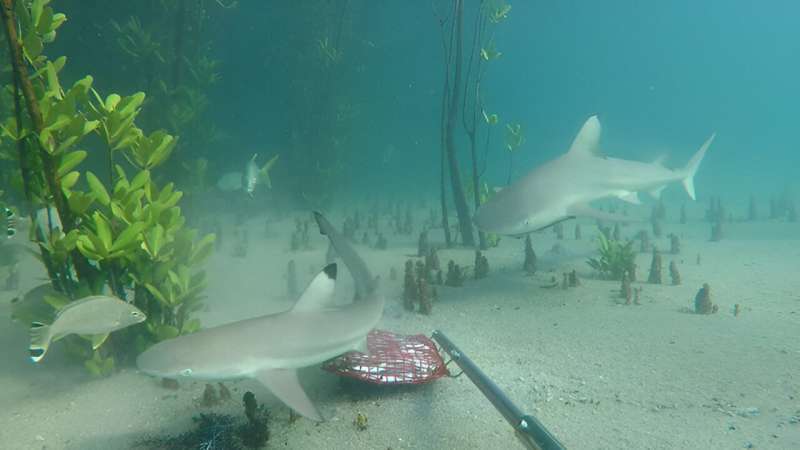This article has been reviewed according to Science X's editorial process and policies. Editors have highlighted the following attributes while ensuring the content's credibility:
fact-checked
peer-reviewed publication
trusted source
proofread
Unveiling sea country management monitoring trends in Australia

AIMS scientists have partnered with Indigenous communities in the remote Kimberley region of Australia's northwest to monitor culturally important fish populations on coral reefs and incorporate the variability in data to better inform sea country management.
Monitoring data collected over small areas and short timeframes carries a level of uncertainty, particularly when monitoring fish that move between areas and habitats. Bardi Jawi Rangers, who oversee the Bardi Jawi Indigenous Protected Area (IPA), rely on these data to make management decisions. A new study by AIMS scientists explores a novel way to communicate this uncertainty when presenting results to the Rangers and the community.
The paper is published in the journal Ambio.
AIMS fish ecologist and lead co-author Dr. Kathy Cure said Traditional Owners who look after sea country across remote northern Australia are forming more partnerships with science organizations to monitor the health of marine habitats and combine Traditional Ecological Knowledge with western science and technology.
"Especially important in these partnerships is how we, as scientists, communicate results from monitoring activities. Marine environments in northwest Australia are incredibly dynamic due to the movement of fish between habitats and changes from year to year influenced by variations in juvenile recruitment, habitat condition, productivity and oceanographic conditions," she said.
Monitoring on sea country
Bardi Jawi sea country is rich in biodiversity. It features a mosaic of different habitats, such as tidal pools, mangroves, seagrass and algal beds, and coral reefs.
AIMS and the Bardi Jawi Rangers co-designed a monitoring program, merging the expertise of AIMS coral reef and fish monitoring scientists with Traditional Ecological Knowledge.
The Rangers received training in different monitoring techniques and technologies, including baited remote underwater video stations (BRUVS), which are a common fish-surveying tool. The diverless method allows for long-term records of fish communities at each location.
Kevin George, Bardi Jawi Senior Cultural Ranger and community Elder, said that Bardi Jawi people are concerned that fish are threatened by an increase in recreational fishing.
"We want to make sure that this food source is available for younger generations. Knowing what and how many culturally important fish species are in certain areas supports a key conservation goal set out in the sea country management plan," he said.
Estimating trends for sea country
Natural variability in a marine habitat is revealed when monitoring the same location over a period of time. Sharing this information between scientists, Traditional Owners and decision makers can be challenging.
The team of AIMS scientists used Bayesian statistics to reliably estimate and convey the natural variability monitoring results revealed.
AIMS statistician and lead co-author Dr. Diego Barneche explains that some monitoring data, like that collected using BRUVs, can carry uncertainty. Fish are mobile and the mosaic of habitats in the Kimberley makes it more complex. This uncertainty needs to be carefully reported, which is why the researchers used Bayesian statistics.
"In our study we wanted to quantify how certain we might be that coastal fish numbers in Bardi Jawi sea country had changed, or stayed the same, over the past five years. In Bayesian statistics, we can calculate the chances of each of those scenarios, instead of making very simplistic "yes" or "no" statements," Dr. Barneche said.
"Bayesian statistics offers an intuitive approach to express how confident we are about something, based on our existing knowledge and the data we have collected."
Sharing results on sea country
AIMS scientists provided results using a variety of presentation formats to Elders, decision makers and the broader Bardi Jawi community. During these activities, which included workshops, short film productions and co-presentations at national science conferences, scientists evaluated how results from the monitoring program were understood, interpreted, and accepted.
"We found communicating monitoring results as a health category, and including a probability estimate for all possible health categories in the Bardi Jawi Healthy Country Plan, offered an intuitive way to show both uncertainty and credibility, providing a stronger basis for more accurate decision-making from monitoring data," said Dr. Cure.
The Bardi Jawi people have a long history of managing their fisheries using traditional methods, such as seasonal catch restrictions. However, with increasing pressures on their sea country, monitoring data may play an increasingly important role.
Senior cultural Bardi Jawi Ranger Kevin George said it's inevitable that we're going to have more visitation.
"It's the right time for Bardi Jawi people to monitor and engage with research scientists to gather information. Using both Bardi Jawi traditional knowledge and modern science, we can assess how healthy our reefs and fish stocks are so that we are able to put in place management for the marine park to be able to serve its purpose for everyone," he continued.
"The monitoring program has been a fantastic learning experience for all the Bardi Jawi community. We feel engaged, informed and empowered," said Kevin.
Into the future, the importance of monitoring data may increase to assist in the decision-making and management for both the IPA and Bardi Jawi Gaarra Marine Park.
This research is part of the Northern Australian Marine Monitoring Alliance (NAMMA), and is a partnership with Bardi Jawi Rangers and Traditional Owners, and the Kimberley Land Council.
More information: Katherine Cure et al, Incorporating uncertainty in Indigenous sea Country monitoring with Bayesian statistics: Towards more informed decision-making, Ambio (2024). DOI: 10.1007/s13280-024-01980-2
Journal information: AMBIO
Provided by Australian Institute of Marine Science




















